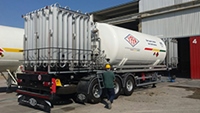SENER participated in the official inauguration of a first virtual gas pipeline in Bolivia on February 15, 2016.
SENER carried out the design, construction and start-up of the virtual gas pipeline before finally handing it over to the client. This system comprises a Liquefied Natural Gas (LNG) plant, a fleet of cryogenic transport tanks and mobile regasification plants, and various satellite regasification stations.
 The plant produces 210 tons of LNG per day and has a storage capacity of up to 3,000 m3, meaning it can supply natural gas to some 140,000 homes across 27 communities in different parts of Bolivia. According to YPFB, the service will later be expanded so that 33 additional municipalities can enjoy the benefits of the virtual pipeline.
The plant produces 210 tons of LNG per day and has a storage capacity of up to 3,000 m3, meaning it can supply natural gas to some 140,000 homes across 27 communities in different parts of Bolivia. According to YPFB, the service will later be expanded so that 33 additional municipalities can enjoy the benefits of the virtual pipeline.
Through a dual nitrogen expansion cycle, the liquefaction plant generates LNG at -160 °C and has a storage capacity for six days. In this liquid phase, the gas is loaded onto cryogenic transport tanks using Tank Lorry Filling (TLF) and is delivered to 27 satellite regasification stations throughout the country. At these destinations, the LNG is stored in cryogenic tanks so it can then be distributed to the municipalities and vehicle service stations.

